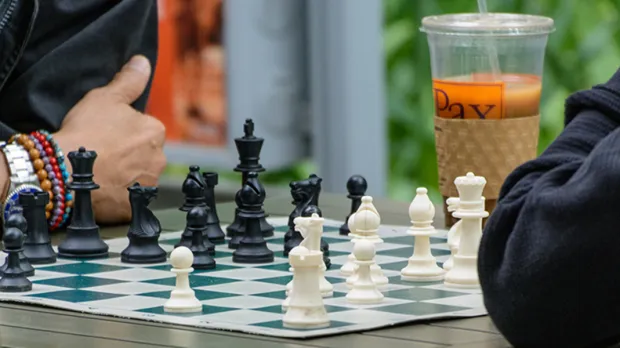Chess is a game played one-on-one where every movement of a piece can make the difference between winning or losing. But it can also be seen as a challenge against yourself. You have to know how to concentrate and look ahead to foresee upcoming moves—both your own and your opponent’s.
Although it may seem that it’s mostly useful for whiling away the long cold days of Siberian winter (Russia is the country with the highest number of grandmasters recognized by the International Chess Federation), chess can rightly be considered a sport, because it requires a great deal of mental exercise and teaches many values. Try sitting down in front of a chessboard with a friend, and you could learn lessons such as these:
1Think before you make decisions
Every move has consequences. It may be that by moving a pawn forward one square—as small a change as it may seem—you leave your queen exposed or, worse yet, your king. Before making a move, you have to be sure that it’s the best option and that you won’t be creating a dangerous situation or setting yourself up for defeat.
It’s faulty reasoning to say, “It’s just a pawn, so it doesn’t matter.” Every movement counts and can be decisive for what will follow.
The same is true in life: our words and actions have consequences. A careless word or gesture can do more harm than we think, just as a thoughtful act of charity or kindness can make a great difference for the better, far beyond the effort it takes us. We have to think before we act, and reflect before we talk.
2You have to pay attention right from the first move
Chess doesn’t allow you to be distracted even for a second. You can’t think, “We’re just starting, so in a little while I’ll start to think more seriously about what I’m doing.” You have to concentrate as soon as the game begins, if not earlier.
In fact, in chess there are tricks to start the game in a way that gives you an immediate advantage. If you are inexperienced and your opponent uses these moves, it gives you the feeling you’ve been blindsided, because it seems like they haven’t even given you time to look at the board and they’ve already beaten you.
This is true about many things. If we aren’t careful right from the start, we can make mistakes or miss opportunities that will cost us time and effort later on, or even lead to failure.
3Look ahead at different possible scenarios
You can’t limit yourself to thinking about the way the board looks now. You have to use your mind to imagine what could happen to each of the pieces you move, how your opponent could react, and what the consequences could be further down the line. Imagining possible future scenarios will help you foresee and avoid the loss of your queen, for example, or above all, ending up with your king in check.
Chess isn’t a game of chance; quite the contrary, it’s about planning and strategy, and about figuring out what your opponent wants to do before he or she does it, while trying to keep your opponent from doing the same with you.
Thinking ahead, as in chess, is a vital life skill. The decisions we make today about our studies, finances, and relationships can have long-term effects that are not immediately apparent in the moment.
4You have to make a move
During chess tournaments, players have a limited time to move their pieces. During an international tournament game, players have 2 hours to make their first 40 moves, and then another hour for the next 20. A chess clock is placed on the table so players can keep track of the time. This keeps players from taking forever to make a decision, and thus forces them to make moves.
While reflection is important, as mentioned above, it’s also vital that we be able to make decisions and not get caught up in eternal deliberation and indecision. If we don’t take action in a timely fashion, we sometimes end up in a worse position than if we’d chosen any of the alternatives we’d considered.
5Be patient
When you see that your opponent has made a move that will allow you to capture one of his or her pieces, you can end up feeling excited and anxious to make that countermove. But, you have to be patient and wait your turn—and consider whether or not that might be a trap, as well, to make you lower your defenses somewhere else on the board.
Patience is a virtue that makes us strong because it demands that we resist our impulses. As it happens, virtues complement and strengthen each other; if we become more patient, we’ll be stronger and our mind will be better prepared to reflect and make good decisions.
These are just some of the ways that chess—and other games—contain lessons that can help us in real life. The next time you sit down to play a board game, know that you’re not “wasting time,” you’re training yourself for life.

Read more:
Are large families becoming trendy again?

Read more:
10 Things you’ll regret not doing with your kids

